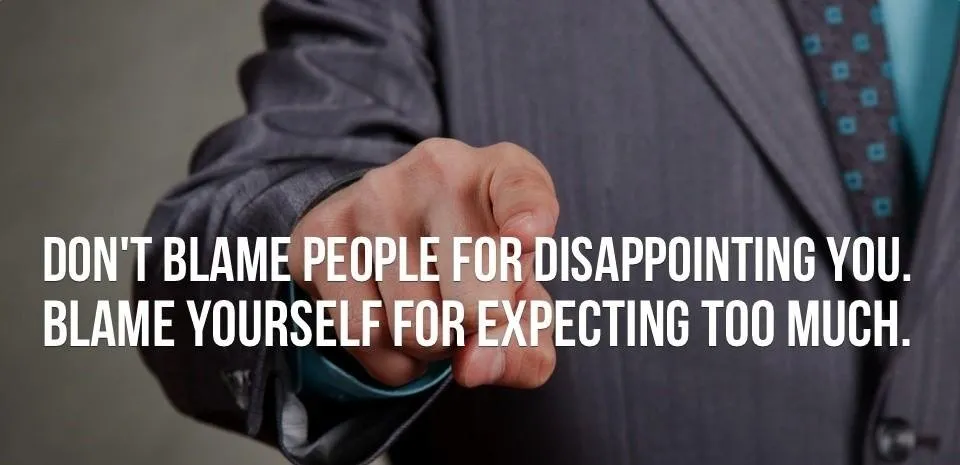
Do you trust that ideally everything would go right without fail? Toward the starting that sounds really pleasant, particularly on the off chance that it is an extreme change from your current conditions. In our dreams, things work out, we get the "yes", and occasions go precisely as we arranged. The issue is that conviction can get exhausting, so we tinker, we attempt new things, and we analyze. That is the point at which it occurs:
Sometimes things turn out badly.
What you do next is the thing that has a significant effect. Is it your regular reaction to cast about for who fouled up? That may appear to be down to earth: all things considered, until the point that you know who committed the error, you can't settle it. Do you search for what turned out badly? Not simply individuals are included; there are things and there are forms. Maybe one of them is flawed. Who was in control at any rate? Possibly it was a disappointment of administration or guidance or preparing—all things considered, the buck needs to stop some place.
Before we head down these streets, we have to check a certain something: What is our goal in this request? Is it accurate to say that we are searching for somebody to stick it on? It is safe to say that we are searching for something to "settle"? Is it accurate to say that we are searching for a pioneer to criticize?
These are the basic inspirations. In legislative issues, business, and the social scene, a most loved side interest is discovering shortcoming. News TV is brimming with talking heads who are allocating accuse all over the place and energizing to supplant those to blame. Sadly, their substitutions turn into the following targets and the cycle proceeds.
Just a couple are solid enough to acknowledge fault and assume liability when something goes south. Just a subset of those solid people figures out how to cling to confront their next investigation. yet, there are such people and we can show ourselves after them. What do they do any other way than the individuals who keep running from the fault?
Before we go further, we have to get a few definitions straight. What is fault, what is blame, and what is duty?
To be dependable is to be liable or responsible. It implies that we will be estimated.
To be to blame is to be in charge of a disappointment or more terrible, an improper demonstration.
Finally, to fault isn't simply to consider dependable yet to discover blame with.
How to Approach Responsibility
There are approaches to approach duty that work and ways that don't. We should begin with the last mentioned. At the point when our attention is on reprimand, it is tied in with discovering somebody to get. It dismisses center from what turned out badly and how to shield it from turning out badly once more. It is judgmental and malignant.
Fault is frequently used to redirect consideration far from ourselves. All things considered, we don't need the fault—who ever needs to be "to blame"? Be that as it may, habitual pettiness demonstrates an absence of comprehension of what obligation on a very basic level is. Duty can't be doled out sometime later despite the fact that many endeavor to do as such. Duty was constantly present, regardless of whether it was not recognized. When you begin to understand this, you quit faulting others. You start concentrating without anyone else job, regardless of whether in real life or in relinquishment.
This is a mental breakthrough however a few people lose it instantly by making one basic blunder: they supplant accusing others with pointing the finger at themselves. This transforms into self-recrimination, self-judgment and self-loathing. Pointing the finger at yourself isn't indistinguishable thing from assuming liability: truth be told, it is an approach to abstain from assuming liability.
In what capacity?
The focal point of fault is to discover blame. Its goal is judgmental to its center. Getting yourself liable wouldn't transform anything, settle anything or enhance anything. Assuming liability, then again, has an unrivaled goal—it is about responsibility. It is a task, not a decision. When something is allocated to us, we take care to oversee it, ensure it, and make it effective, so in conditions where many go from fault to self-fault, would you be able to see the predominant way of concentrating on task? Whatever happened is presently a supplier of new and helpful data, instead of a diversion from your goals like fault can be.
There is one other turn of an expression we should be careful about. That expression is "to consider mindful". Truly, it has "capable" in it, however don't be tricked: the dynamic word is "hold". It's only a remain in for discovering shortcoming. Keep in mind, obligation simply is, and it was, yet it can't be doled out sometime later. A superior expression to grasp is "to acknowledge duty". It is ideal in the event that you do it ahead of time. It is difficult on the off chance that you need to do it sometime later yet remember that your acknowledgment didn't bring your duty into reality, it was at that point present.
In the event that duty is seeming like a genuine issue, it is, yet is anything but a carnival like fault and censorious. Remove obligation carefully and remain from fault. On the off chance that you do, you will find that things quiet down and get clearer. It feels preferred to be mindful over to only persevere through the fault.